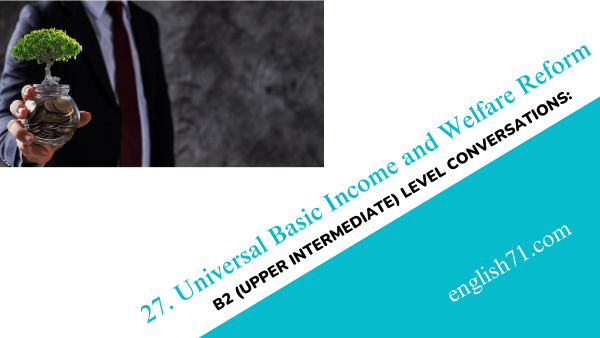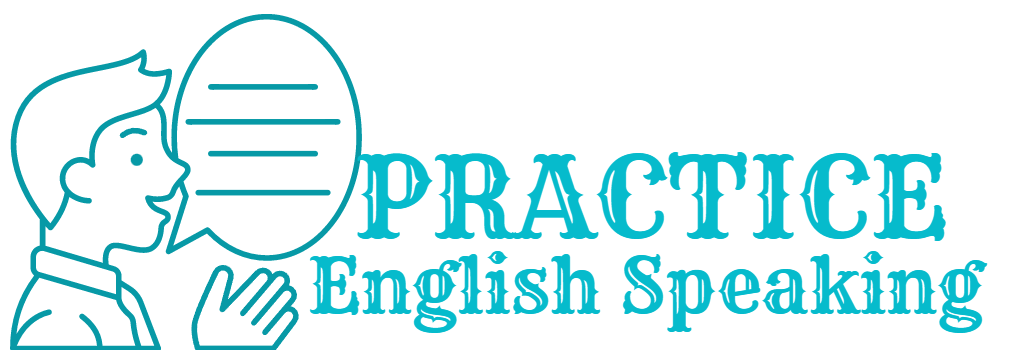B2 (Upper Intermediate) level Conversations: (27) Universal Basic Income and Welfare Reform

John: Hey Gabriel, have you been following discussions on universal basic income (UBI) and welfare reform?
Gabriel: Absolutely, John. It’s an intriguing topic. Some argue that UBI could provide financial security, while others express concerns about its feasibility and potential impact on work incentives.
John: Right. The idea of providing a fixed income to every citizen, regardless of employment, is gaining attention. Proponents believe it could alleviate poverty and address job insecurity. What are your thoughts?
Gabriel: Well, I see the potential benefits, especially in addressing income inequality. It could offer a safety net and empower individuals to pursue meaningful work without the fear of financial instability.
John: True. But there are also concerns about funding UBI and the impact on government budgets. Some propose redirecting funds from existing welfare programs. Have you come across any innovative funding models?
Gabriel: I’ve read about experiments with taxing technology companies or implementing a wealth tax. However, the challenge lies in finding a sustainable and equitable funding solution.
John: That’s a valid point. Transitioning from traditional welfare systems to UBI would require careful planning. It’s essential to ensure that vulnerable populations don’t face unintended consequences.
Gabriel: Absolutely. Speaking of welfare reform, what are your thoughts on reimagining the current welfare system?
John: I believe there’s room for improvement. Streamlining bureaucracy, increasing access to education and training, and focusing on preventive measures could create a more effective system. What reforms do you think are necessary?
Gabriel: Enhancing accessibility to education and skill-building opportunities is crucial. Additionally, personalized support systems that address individual needs could be more effective than a one-size-fits-all approach.
John: Agreed. Tailoring assistance to individual circumstances can lead to more positive outcomes. It’s about fostering self-sufficiency and empowering people to overcome challenges. Have you seen any successful welfare reform models?
Gabriel: Nordic countries often come up in discussions due to their comprehensive social welfare systems. They prioritize education, healthcare, and unemployment benefits, contributing to lower poverty rates.
John: Nordic models indeed provide interesting insights. Adapting successful elements to different contexts could be part of the solution. But it’s crucial to consider the unique challenges each country faces.
Gabriel: Definitely. One size doesn’t fit all. Local context, economic conditions, and cultural factors play a significant role in the success of any welfare system.
John: True. It’s a complex but vital conversation. Finding the right balance between providing support and encouraging self-sufficiency is key. What are your hopes for the future of welfare systems?
Gabriel: I hope for systems that prioritize human dignity, equal opportunities, and long-term well-being. It’s about creating a safety net that empowers individuals to lead fulfilling lives.
John: Well said, Gabriel. The conversation around UBI and welfare reform is essential for shaping a more inclusive and equitable society.
Gabriel: Absolutely, John. Let’s hope for thoughtful and effective reforms that benefit everyone.



Summary:
John and Gabriel engage in a thoughtful conversation about universal basic income (UBI) and welfare reform. They discuss the potential benefits of UBI in addressing income inequality and job insecurity, acknowledging concerns about funding and the need for innovative models. The conversation also explores the challenges of transitioning from traditional welfare systems to UBI, emphasizing the importance of careful planning to avoid unintended consequences. John and Gabriel express the need for reimagining the current welfare system, focusing on personalized support, education, and skill-building opportunities. They highlight successful welfare reform models, such as those in Nordic countries, and stress the importance of adapting approaches to local contexts. Ultimately, their hope is for welfare systems that prioritize human dignity, equal opportunities, and long-term well-being to create a more inclusive and equitable society.

